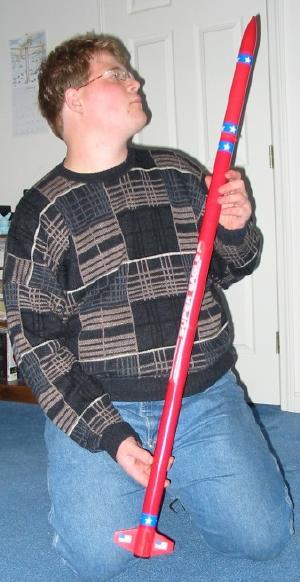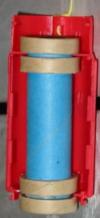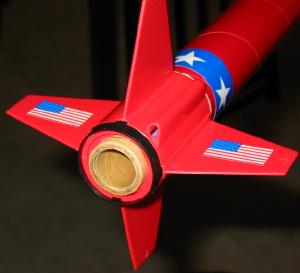| Manufacturer: | Quest  |

(Contributed - by Douglas Gardei)
 Brief:
Brief:
The Super Eagle Kit is designed to take the higher impulse 18mm D size motors
by Aerotech.
Modifications:
This is the second Quest Quick Kit I have built. From the first one I know that
the motor mount construction is a bit flimsy. The only thing that is preventing
the motor from shooting up inside the rocket is two plastic tabs. My concern is
what will happen when those tabs melt down via the ejection charges of the
motors used? If that happens, nothing will prevent the motor from launching,
leaving the rocket behind. Due to this concern, I decided to beef up the motor
mount.
The supplies needed for my modification:
- 4 BT20-50 Centering Rings
- 1 BT5-10 Centering Ring (Thrust Ring)
 The motor mount is
mounted inside the two plastic halves of the rocket. In order for the centering
rings to fit, the plastic tabs used to support the motor tube have to be
removed. I did this with a sharp hobby knife. I noticed that the 18mm tube was
too wide for the centering rings to fit over them, so I replaced the Quest
motor tube with an Estes tube (which the rings were designed for anyway). I
glued the thrust ring into the forward end of the motor tube. After checking
the alignment, I glued the centering rings to both ends of the motor tube,
giving enough space between the rings to clear the plastic centering rings on
the fin can halfs. (See photo).
The motor mount is
mounted inside the two plastic halves of the rocket. In order for the centering
rings to fit, the plastic tabs used to support the motor tube have to be
removed. I did this with a sharp hobby knife. I noticed that the 18mm tube was
too wide for the centering rings to fit over them, so I replaced the Quest
motor tube with an Estes tube (which the rings were designed for anyway). I
glued the thrust ring into the forward end of the motor tube. After checking
the alignment, I glued the centering rings to both ends of the motor tube,
giving enough space between the rings to clear the plastic centering rings on
the fin can halfs. (See photo).
The fin can was then finished using plastic cement according to the instructions. Since paper centering rings are now used, the plastic motor retainer can not be used. Any motor used in this rocket will have to be friction fitted into the motor tube.
 Construction:
Construction:
The Super Eagle comes with three lengths of red tubing, one shorter than the
other two. The majority of plastic parts in this kit are red. These parts
include the fin can halves, four fins, nosecone, two tube couplers, shock cord
anchor, and the black support ring and motor retainer. Also included is a blue
18mm motor tube, Kevlar
® and elastic cords, two 14" parachutes with pre-cut shroud lines
and tape disks.
The rest of the rocket assembly was straight forward. The fit of the plastic tube counplers in the body tube is a bit loose, so alignment is an issue when gluing the tubes together. Also, care has to be taken to make sure the launch lug tabs are lined up with each other. The nose cone section also had a loose fit, but a couple wraps of masking tape fixed this.
Finishing:
The rocket does not require painting, and the decals were easy to apply.
Construction Rating: 4 out of 5
 Flight:
Flight:
March 1st, while helping out with the Team America Rocketry Challenge, I got
the opportunity to try out my Super Eagle. I loaded the model with a Quest C6-3
and Estes wadding, packed both chutes, and placed the rocket onto the launch
pad. The flight with the C6-3 was wobbly. It went about 200-300 ft, and both
chutes deployed. The rocket was recovered without any damage. I thought about
trying the rocket with a D13 on or D24, but I decided against it due to the
small field size we were using. The D motor flight will take place at the April
CMASS launch.
Flight Rating: 3 out of 5
Summary:
I believe my two improvements to the kit: upgrading the motor mount and tying
the payload section to the booster is a good idea. The rocket is underpowered
with the C6 motor, and leaving the two sections seperated is an invitation for
loosing something. If I build another Super Eagle, I would probabily opt for a
24mm or a 29mm motor mount. With some reinforcements to the fins, I can see
this rocket flying great with an G40-10W.
Overall Rating: 3 out of 5
Other Reviews
- Quest Super Eagle By John Lee (January 11, 2010)
Brief: QuickKit, 4FNC, 18mm motors, Parachute Recovery While being bummed out about having various projects under construction or repair and still being unable to work on anything in my available time due to drying glue, paint, etc, I decided that one more wouldn't hurt and looked for an easy one near the top of the stack. The Quest Super Eagle was the "winner". The Super Eagle is a Quick ...
 |
 |
Flights
 |
 |
D.P. (May 9, 2007)
 |
 |
H.A.F. (July 14, 2005)